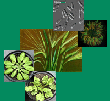| Fountain, MD; Valdes, O; Fettig, S; Beck, E: Expression of cell cycle control factors in non-dividing and ageing photoautotrophic plant cells, Physiologia Plantarum, 119, 30-39 (2003), doi:10.1034/j.1399-3054.2003.00169.x | |
| Stichworte: TOBACCO BY-2 CELLS,OXIDATIVE STRESS,DEPENDENT KINASE,LEAF SENESCENCE,RETINOBLASTOMA PROTEIN,CHENOPODIUM-RUBRUM,GROWTH-REGULATORS,FLOW-CYTOMETRY,ABSCISIC-ACID,ARABIDOPSIS | |
| Abstract: n contrast to the closely controlled phenomenon of plant senescence, very little is known about the molecular processes leading to ageing, which is understood as stochastic degeneration. In plants ageing apparently commences when cell division expires. To explore the relation between cell division and ageing, the expression of cell cycle control genes in the course of a batch culture of photoautotrophic cells of Chenopodium rubrum was studied. In a time-span of 3 months this culture passes through the developmental phases: division (4 weeks), stationary (5 weeks) and ageing (3-4 weeks). Transcripts of 8 cell cycle control genes (cyclins A/B, D2 and D3, an A-type CDKA and CDKB; 1, Rb-Protein, E2F and of an inhibitor ICDK) could be detected in all stages of the batch culture. Expression of CycD2, CDKB; 1 and Rb markedly declined with the transition from the division to the stationary phase of the cell culture and remained low until the cells died. Transcript levels of the A-type CDK, cyclins A/B and D3, as well as ICDK, passed through a maximum in the division phase but peaked again in the course of the stationary phase. Levels of the E2F transcript were high in the division and the early stationary phase and then stepwise declined. Addition of cytokinin plus auxin (2,4-D) to the culture during the first week of the stationary phase resulted in a transitory resumption of cell division, or at least of the G1-S-transition, concomitantly with a temporary increase in the transcript levels of CycD2, CycD3, CycA/B, CDKA and ICDK. Expression of Rb did not substantially change upon supply of the phytohormones and that of the CDKB; 1 and E2F was even suppressed. The results show that in the C. rubrum batch culture both the G1-S and the G2-M transition were arrested after 4 weeks of cell culture and that this was set by the downregulation of the expression of CycD2 and Rb on the G1-S- and of CDKB; 1 on the G2-M-transition. Only the lowering of the CycD2 transcript level was reversible with cytokinin and 2,4-D. The increase of the ICDK-transcript level during the stationary phase and in particular upon addition of the phytohormones is interpreted with regard to auxin-triggered cell enlargement in the course of the stationary phase. A signal sequence is concluded, starting from the deterioration of the nutritional situation of the cells in the batch culture, and manifested by the decrease of the endogenous phytohormone levels, that results in a different expression of cell cycle control genes. Such a signal transduction cascade may include other components as well, and may additionally be affected by oxidative stress, which increases upon ageing. |

